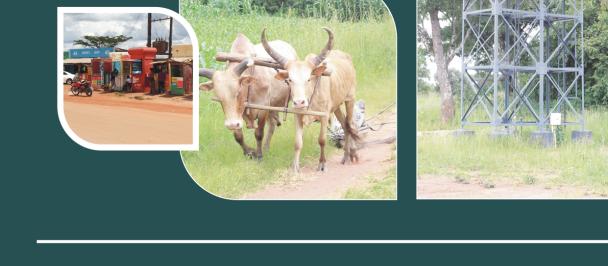Zambia Joins Clarion Call to End Gender-Based Violence in Southern Africa
October 17, 2023

Attendees at the UN Zambia Joint SDG Fund Event
Lusaka, 13 October 2023 – The United Nations (UN) in Zambia has joined other UN teams in five Southern African countries in preparing a five-year program aimed at eliminating Gender Based Violence (GBV) in Southern Africa, alongside Governments, Partners and Civil Society organizations.
The intervention comes amidst revelations that an estimated 33 percent of women in Southern Africa have experienced Intimate Partner Violence (IPV) in their lifetime, compared to the global 27 percent. These statistics have stirred up countries in the sub-region to escalate an innovative and whole-of-society approach of response and preventive measures against GBV in the region.
Speaking during a satellite meeting held in Lusaka for the High-Level Partnership Rountable meeting in Pretoria on 10 October 2023, Gender Division Permanent Secretary Ms Mainga Kabika appreciated support from the governments of Ireland and Sweden, United Kingdom, the United States of America as well as the European Union in addressing GBV. She noted the GBV is a human rights violation that impacts development
“We must recognize that Gender-Based Violence is a human rights violation that impedes social progress, economic development, and the achievement of sustainable development goals. Our collective response as governments must strive to be holistic, inclusive, and multi-faceted"— Mainga Kabika, Permanent Secretary of the Gender Division Office of the President
Speaking at the Pretoria meeting that brought together six UN Country Teams, Governments, cooperating partners and civil society organizations from the six countries - Botswana, Eswatini, Lesotho, Namibia, South Africa and Zambia, the UN Resident Coordinator in Zambia, Ms Beatrice Mutali, called for a more intensive and concerted approach by all to push for concrete changes to help fight GBV.
"We have the full support of the UN Secretary General, who included the fight against GBV and the Spotlight Initiative as one of the 12 High Impact initiatives aimed at demonstrating that transformative progress is possible despite challenging global circumstances to achieve the SDGs by 2030. We all need to do our part, through targeted communications and key messages that will drive positive behaviour change in Southern Africa"— Beatrice Mutali, UN Zambia Resident Coordinator
Ms Mutali said that the worrying statistics indicate that Southern African is a leading sub-region on the continent with disturbingly high GBV prevalence and that advocacy and communication at various levels need to be heightened for effective behavioural change.
Meanwhile Chairperson of the Partnership Roundtable UN Resident Coordinator for Lesotho, Ms Amanda Mukwashi lamented the daily violence that women and girls face, which remains a “footnote in development” and relegated to a social development that is not considered as a big-ticket item such as the economy, natural resources and governance.
In a bid to demystify GBV by giving a voice to GBV Survivors, participants heard testimonies from South Africa, Eswatini, Namibia and Zambia that revealed the need to break the silence and cultural norms which contribute to perpetuating GBV.
The meeting demonstrated a linkage between development and GBV, poverty and GBV, which must be eliminated if women are to become free. The correlation was made by the Guest of Honour, Honourable Minister of Women, Youths and Disabilities for South Africa, Ms Nkosazana Dlamini. “Because we have created an environment of dependency, where women depend on men for survival and in a case where women decide to separate from this dependency, they often become victims of GBV,” Ms Dlamini-Zuma said.
The call for a systemic and wholesome approach to end GBV, which was made at the High Level Partner Sub-Regional meeting, is timely with the launch of the five-year anti-GBV programme that builds on the experiences and lessons learned from the previous Spotlight Initiative and focusses on transformative pillars of action such as human rights-based approach, leaving no one behind, national capacity and ownership, and a whole-system approach.
This, according to Ms Beatrice Mutali, is an approach that must be embraced because it focuses “on implementing the principle of Leave No One Behind by ensuring the inclusion of Persons with Disabilities and other marginalised and underserved populations”.
Citing her government’s commitment to continued partnership in fighting GBV, the Irish Ambassador to Zambia and Namibia, Ms Bronagh Carr, who spoke through a video message, noted that GBV was a core priority for Ireland.
“The task we have ahead is immense and will require all our inputs and all of our support. The focus must be on changing attitudes, gender roles and stereotypes, it means making violence against women and girls unacceptable. Lessons learnt in the previous Spotlight Initiative must be well articulated and disseminated,” Ambassador Carr said, who called for ensuring that prevention was at the heart of the intervention.
Other Cooperating Partners whose voices were heard in support of the Joint Initiative include the European Union, the United States of America, Canada and France. Those present in the satellite meeting in Lusaka included Zambia’s Permanent Secretary for Gender, Ms Mainga Kabika, representatives from the embassies of Ireland and Sweden, FDCO, USAID, academia, NGOs, people with disabilities, women and youth group leaders.
###
For more information, please contact:
Mark Maseko, National Information Officer; United Nations Information Centre (UNIC), Lusaka, P: +260-211-386200;

 Locations
Locations








